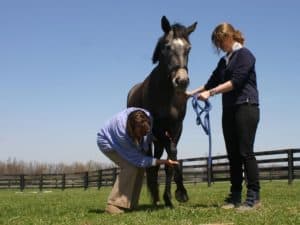Excitement, Feeling, and Attachment’s Impact on Training
- Topics: Article, Behavior, Horsemanship Science
Horse training techniques range from positive and negative reinforcement to clicker training, food or scratching rewards, vocal commands, and more. But if you can’t get your horse to respond to any of these methods, you might not be taking into consideration how the horse feels.
According to two leading equitation scientists, the success or failure of training has a lot to do with the horse’s state of “arousal” as well as his level of “attachment”—as in, attachment to you, his person.
Andrew McLean, BSc, PhD, Dipl. Ed, owner and director of the Australian Equine Behaviour Center, and Paul McGreevy, BVSc, MRCVS, PhD, MACVSc, professor of animal behavior and animal welfare science at the University of Sydney in New South Wales, Australia, lectured on the new concepts of equine arousal, affective state, and attachment during their joint plenary session at the 9th International Society for Equitation Science Conference, held July 17-19 at the University of Delaware, in Newark.
By “arousal,” McLean and McGreevy mean how excited a horse is at a given moment. This isn’t about the horse’s temperament or how excitable he is generally, they said, but how alert the horse is. Take the moment you’re trying to train him to stand still while you fly spray him, for instance: If he’s excited, jumpy, and looking every which way, your training methods might seem to just blow away in the wind—not unlike the fly spray you’re trying to apply
Create a free account with TheHorse.com to view this content.
TheHorse.com is home to thousands of free articles about horse health care. In order to access some of our exclusive free content, you must be signed into TheHorse.com.
Start your free account today!
Already have an account?
and continue reading.

Written by:
Christa Lesté-Lasserre, MA
Related Articles
Stay on top of the most recent Horse Health news with












